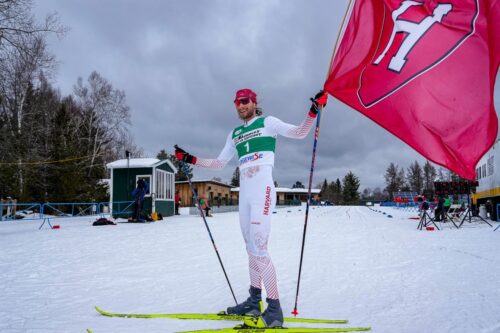Rémi “Rem-Dog” Drolet ’24 is the captain of the Harvard Nordic Ski Team, sporting his iconic man bun as a crown.
In his first season of racing for the Crimson on the Eastern Intercollegiate Ski Association Circuit (EISA) in 2020, Drolet had several outstanding performances within the conference, qualifying him for the NCAA Championships (which were canceled due to the pandemic in 2020 and 2021). Drolet then returned to the NCAA stage in 2023, as a junior, to be crowned the NCAA Individual Champion in the Men’s 20k classic mass start. A mass start race is when the entire field of competition (at NCAA Championships, there are around 40 athletes in the men’s category) starts together for a head-to-head race.
In the 2024 competition season, Drolet secured back-to-back wins in the EISA Harvard Carnival as team captain and the top points scorer for the Crimson every weekend of racing. He has qualified to defend his title at the 2024 NCAA Championships in Steamboat Springs, Colorado.
Beyond the NCAA, Drolet took a semester off as a rising junior to compete for his home country of Canada at the Beijing Olympics in 2022. There, Drolet achieved 33rd place in the 15km classic followed by a 35th-place finish in the 50-kilometer skate mass start. Before this, Drolet made his debut on the international stage at the FIS World Junior Championships in 2017; he would return to this event three more times, and his best individual result there was a fourth-place finish in 2020. At the 2020 event, he was also a member of the Canadian men’s relay team which achieved a silver medal, the first international relay medal at any level for the country. Additionally, Remi raced at the senior World Championships during his sophomore year. “That was definitely a bit of a challenge because it was really hard to balance that with keeping up with classes and trying to keep up with some of the fastest skiers in the world [who train full-time as professional athletes],” Drolet said.
Each year, Drolet logs around 750 hours of training, an incredible undertaking as a full-time college student. Nordic skiing is an impressive test of aerobic and muscular endurance in which athletes compete in the sprint as well as distance events of both the classic and skate techniques. Sprints are about three-quarters of a mile in length, and skiers compete in a qualifying round followed by a quarter-final, semi-final, and final for the top 30, 12, and 6 skiers respectively. Distance races—Drolet’s specialty—range from 5 to 50 kilometers in length (the longest race at the NCAA level is 20 kilometers). Nordic skiing is also subdivided into skate and classic techniques: with skate skiing your legs have a more lateral movement (similar to ice skating), whereas in classic skiing, your skis remain parallel to each other in a set of tracks in the snow and have a section of grippy wax on the bottom of the ski.
Hailing from the rural mountain town of Rossland, British Columbia, it only makes sense that Drolet would excel in a sport involving climbing and descending snow-covered hills at impressive speeds. “As is kind of a right of passage in Canada,” Drolet grew up playing hockey, Alpine skiing, and Nordic skiing. Eventually, he joined the local ski racing team. “Having such great people around me in the skiing community around me in Rossland, and going forward, has really kept me in the sport,” Drolet explained. “For those who live there, it’s the greatest place on earth,” he said, commenting on the environment he grew up in.
Upon arriving at Harvard, Drolet was “a bit concerned about what it would be like” skiing in Boston. After a recruitment visit and many conversations with then Head Coach, Chris City ’94, Drolet said “it just kind of clicked… [It] felt like somewhere I would really love to be that would make me really, really happy.” Drolet’s initial feelings were correct as he has found success academically and athletically throughout his four years on Harvard’s campus.
The Harvard Nordic Ski Team does the bulk of their winter training at the Weston Ski Track, a mere 15-minute drive from campus. This golf course covered in man-made snow is far from an idyllic mountain trail, but every Harvard Nordic Skier learns to love it after the endless hours they spend working hard with their teammates. When visiting Harvard for the first time it was “impressive how they pulled it off,” recalled Drolet, referring to how the Nordic Team manages to excel in Harvard classes and ski train in Boston. Drolet exemplifies this balancing act today as a Physics and Math concentrator and successful athlete. “It’s been a bit of a journey to figure out how to balance everything really well,” said Drolet. As most student-athletes at an academically demanding school such as Harvard would agree, “there is no perfect balance because, at the end of the day, you always need to sacrifice something a little bit.”
Now with his undergraduate finish line in sight, Drolet has begun to set big goals for continuing to compete and perform on the world stage. “I’d love to be able to go back to the Olympics [in 2026] and fight for some good positions there.” As much as he has enjoyed pushing himself academically at Harvard, he added that “it’s going to be really cool to commit myself as much as I need to the skiing aspect to be able to pull out the best results that I’m capable of.”
Breagh Bridge ’27 (breaghbridge@college.harvard.edu) hopes this article brings Harvard Nordic Skiing new fans.

